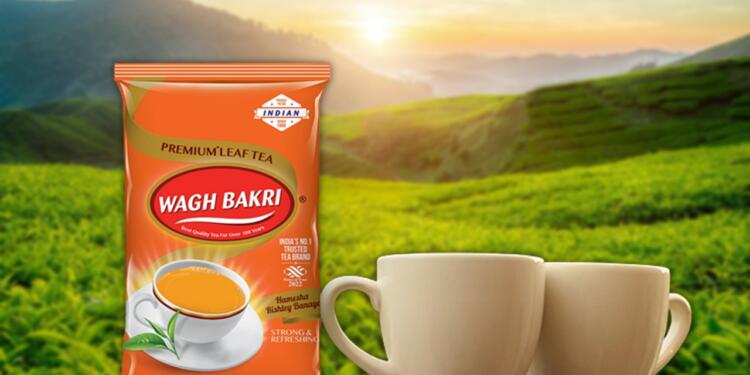In the ultra-competitive tea world with brands like Brooke Bond and Tata Tea in fray, there’s a brand that has stood strong with the test of time – WaghBakri Chai. This name is known not only for good tea but also for something special about the way it’s seen. Have you ever wondered why this name was chosen and how it remains so popular? Let’s dive in and explore the interesting tale of WaghBakri Chai – a name that’s more than just tea.
From the Estates of South Africa to “Wagh Bakri”
The enduring legacy of WaghBakri finds its roots in a historical journey that spans over a century. Founded in 1892 by entrepreneur Narayandas Desai, who had garnered substantial experience in the tea industry while managing a tea garden in South Africa, the brand’s trajectory commenced with his return to India. Desai’s vision materialized into the establishment of the Gujarat Tea Depot Co., a predecessor to the iconic WaghBakri Chai brand.
It was in 1934 that the distinctive name ‘WaghBakri’ was bestowed upon the brand, marking a pivotal moment in its evolution. Prior to this rechristening, the brand operated under the banner of Gujarat Tea Depot Co. The subsequent rebranding of the company as Gujarat Tea Processors & Packers Ltd. signaled its transformation into a more comprehensive entity, poised to encompass the facets of tea processing and packaging.
The nascent phase of the brand’s journey witnessed its sales primarily concentrated within the confines of Gujarat. However, by the mid-1990s, a significant expansion was orchestrated, leading to the introduction of the ‘WaghBakri’ chai brand in Rajasthan, Madhya Pradesh, and other states across India. This strategic expansion not only broadened the brand’s geographical footprint but also facilitated its transition from a regional gem to a nationwide favorite.
Also read: From “Fragile Five” to contributing 15 percent in World Growth, India has come a really Long Way
Why WaghBakri was named so and how it created an everlasting legacy
WaghBakri‘s name has a cool story. Imagine a tiger (that’s “Wagh” in Gujarati) and a goat (that’s “Bakri”) drinking tea together from the same cup. It’s like rich and poor, high and low, all sharing a moment over tea. This teaches us that tea brings everyone together, no matter where they come from.
Between 2007 and 2009, WaghBakri Chai reached more places. It started being sold in Maharashtra, Delhi, Uttar Pradesh, and even the National Capital Region (NCR) of India. This was a big step in its journey.
At first, they only sold tea in Gujarat, but in the 1990s, they went bigger, bringing WaghBakri to Rajasthan, Madhya Pradesh, and other states. There is a good reason for the same. WaghBakri is present only in 13 states, largely in central and western parts of the country, as well as a couple of northern and southern states.
“We look at a state as a country. We spent a good 10 years in Rajasthan and Madhya Pradesh, before even thinking of getting into Maharashtra. We spent five years in Maharashtra before launching in Delhi,” says Parag Desai, executive director of Gujarat Tea Processors and Packers Limited.
The reason for this approach is the company’s priority to developing a robust distribution network. “Every year, at our board meeting, we see how many retail outlets and distributors we are going to add,” says Paras. The idea is to “increase the number of sellers. And that is the way we grow our sales”, adds Rasesh, citing the example of Gujarat where the company has a market share of more than 60 percent.
So, WaghBakri isn’t just tea; it’s a story of how a simple name and a cup of tea can bring people together and how a small company can grow into something known all over India.
Wagh Bakri: A Force to Reckon With
WaghBakri’s journey transcends the ordinary world of tea – it’s a brand that’s all about going the extra mile. They didn’t settle for just selling tea in bags. They aimed higher, creating unique spaces called ‘WaghBakri Tea Lounges’ first in Mumbai and later in Delhi. These lounges are more than just spots to sip tea – they’re places where you can explore a wide range of tea flavors and munch on tasty snacks.
In the vast landscape of the tea landscape, WaghBakri has truly made a mark for itself. Imagine this – people in India spend a whopping ₹10,000 crore on packaged tea. Among the giants, two major players, Tata Global Beverages and Hindustan Unilever, held their positions steady, each with around 29 percent and 27 percent market share respectively, from 2012 to 2016.
Here’s where WaghBakri stands out. While others stayed pretty much where they were, WaghBakri’s market share actually grew from roughly 7 percent to about 8 percent during that same period.
This approach, coupled with their unwavering dedication to making top-notch tea, has propelled WaghBakri to a remarkable position. By the year 2016-17, they had achieved an impressive annual sales turnover of ₹1,100 crore, with a staggering tea volume of 42 million kilograms. WaghBakri has had a compound annual growth rate (CAGR) of 10 to 12 percent in volume over the last decade. In the premium segment, WaghBakri’s Good Morning competes with HUL’s Yellow Label and Taj Mahal, while WaghBakri’s Mili is positioned against HUL’s Red Label in the popular segment.
But there’s more to WaghBakri’s success story than just numbers. It’s a story of humble beginnings and a commitment to quality. They started small, yet they never compromised on the quality of their tea. What sets them apart is their unique approach – instead of just keeping all the profits to themselves, they decided to give back to the people who enjoy their tea.
Also read: 10 Indian Entrepreneurs whose fall was as steep as their rise
So, WaghBakri isn’t just any chai company. They’re different and they’ve shown that by thinking smart and caring about their tea and their customers, even a small beginning can turn into something really big.The narrative of WaghBakri’s growth exemplifies the convergence of entrepreneurial spirit, astute branding decisions, and a commitment to quality.
With roots dating back to Narayandas Desai’s experiences in the tea gardens of South Africa, WaghBakri’s journey transformed a simple enterprise into a name that resonates with tea enthusiasts across India. From its humble origins in Gujarat to its widespread recognition today, the legacy of WaghBakri stands as a testament to the enduring appeal of tradition infused with innovation.
Support TFI:
Support us to strengthen the ‘Right’ ideology of cultural nationalism by purchasing the best quality garments from TFI-STORE.COM



























